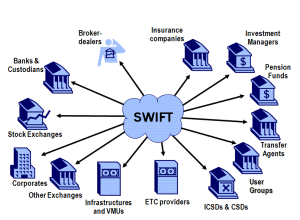 The Society for Worldwide Interbank Financial Telecommunications, widely known as SWIFT, has been a subject of wide discussion in Russia recently, since the British Government suggested cutting it off from the country as part of its sanctions against Russian aggression in Ukraine. This seems to be the most ultimate financial sanction, if imposed.
The Society for Worldwide Interbank Financial Telecommunications, widely known as SWIFT, has been a subject of wide discussion in Russia recently, since the British Government suggested cutting it off from the country as part of its sanctions against Russian aggression in Ukraine. This seems to be the most ultimate financial sanction, if imposed.
SWIFT is a Belgium-based network with traffic of almost 500 million messages a month and conducted among 10,000 financial organizations in over 200 countries. The average daily value of all payments on SWIFT is roughly $6 trillion. The system is not a financial institution or a bank by itself – it is a platform, which allows millions of wires, trades and other transactions to be done sufficiently, fast and with a minimum risk. Russia makes more than 90 percent of its international transactions on SWIFT. What’s more, Russian interbank transactions extensively carried on via the network: over then 600 Russian financial institutions use these telecommunications, as there are no sufficient alternatives to it.
Before SWIFT, banks and other financial institutions in Russia used faxes and telexes. Today these technologies are obsolete, and if used again would make the process longer, more difficult, and thus much less efficient. The system other than SWIFT being used in Russia today is called BESP. It allows banks to communicate and send electronic payments within minutes, but is limited only for ruble transactions.
Meanwhile, there are talks that Russia is building its own payment and messaging system for both international and domestic means. Igor Shuvalov, First Deputy Prime Minister, at the end of last year said Russia was planning to collaborate with China in order to create a new joint platform which would be as competitive as SWIFT. () This is not a short-term project, so to be efficient its development and implementation will take years.
TVRain, the only opposition TV channel in Russia, quotes Putin saying that cutting off SWIFT in Iran did not kill its banking system, so it would not be a catastrophe for the Russian Economy either. This is not quite right. First of all, Iran for the last decades was not as involved in international trade, as Russia. Second, SWIFT was the main argument in Iranian negotiations upon its nuclear program and still remains issue number one in these talks, which confirms how painful the cut off from SWIFT was for Iran. Meanwhile Russia’s leaders do realize how disastrous the impact of such sanction would be on their nation’s economy, as can be seen from  Prime Mister Medvedev’s response to the British threats: “Of course, if these decisions are made, I would like to note that our economic reaction as with any other reaction will be unlimited.” Whatever Medvedev meant, he clearly is afraid of being unable to transact in hard currencies.
Prime Mister Medvedev’s response to the British threats: “Of course, if these decisions are made, I would like to note that our economic reaction as with any other reaction will be unlimited.” Whatever Medvedev meant, he clearly is afraid of being unable to transact in hard currencies.
The main question is what cutting off SWIFT from Russia may lead to in different aspects. The sanctions already imposed against Russia have made access to European and American capital markets for Russian businesses much harder and in certain cases impossible. Big Russian banks are starving for short-term borrowings, facing shortage of cash for day-to-day operations and other current expenses. Without access to SWIFT situation will further deteriorate. Russia’s main source of income is oil exports, but how to get oil dollars without SWIFT? As mentioned above, over 90% of money transfers are done through SWIFT, and not only with Europe or US, but also with China and other Asian markets. Russia will be financially isolated from the entire world for an unforeseen period of time.
There can be different outcomes but if the new Cold War has not started yet, with cutting Russia off SWIFT it surely will, at least in the financial sector. For Russia it will be disastrous. One can only hope that Kremlin will stop short of furthering its military expansion into Eastern Ukraine, as Western leaders already articulated that any new attempt of pro-Russian separatists to extend territory under their control would unavoidably lead to more sanctions.





